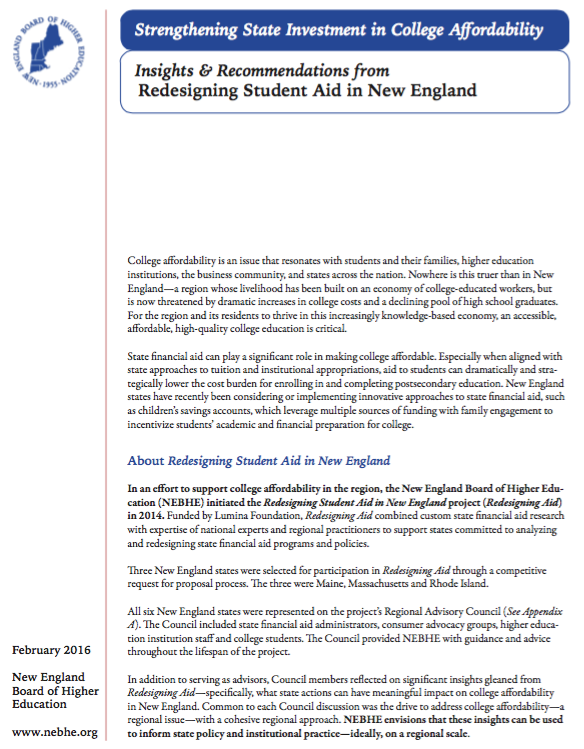 Insights and recommendations from NEBHE’s Redesigning Student Aid in New England project …
Insights and recommendations from NEBHE’s Redesigning Student Aid in New England project …
College affordability has taken center stage for students, their families, legislators and higher education institutions. Nowhere is this truer than in New England. A new report from NEBHE’s Redesigning Student Aid in New England project suggests several strategies for how higher education leaders can strengthen state investment in college affordability—many of which are low or no cost. Examples include asking for student feedback on their understanding of communications and using semi-automated nudges to alert students when financial aid services are most urgently needed.
The Redesigning Student Aid in New England project (Redesigning Aid) is one of the New England Board of Higher Education’s (NEBHE) efforts to support college affordability in the region. Funded by Lumina Foundation, Redesigning Aid combined custom state financial aid research with expertise of national experts and regional practitioners to support states committed to analyzing and redesigning state financial aid programs and policies. Three New England states were selected for participation in Redesigning Aid through a competitive request for proposal process – Maine, Massachusetts and Rhode Island.
Drawn from discussions of the project’s advisory council, which included state financial aid administrators, consumer advocacy groups, college students and institutional staff from all six New England states, NEBHE has shared insights from Redesigning Aid that can have meaningful impact on college affordability—ideally, on a regional scale.
See the report, Strengthening State Investment in College Affordability: Insights and Recommendations from Redesigning Student Aid in New England, for recommendations for higher education leaders focused along five key insights:
- State goals and student needs have dramatically shifted, but the design and characteristics of state financial aid programs have not.
- Higher education leaders can help ensure that legislative interest in college affordability is an opportunity—if leaders are prepared to respond.
- Share responsibility for students and families’ understanding of college affordability by involving students in the design of communications.
- High-touch or intrusive student services are instrumental in helping students navigate financial aid, and they do not necessarily need to be expensive.
- States need greater capacity to collect, maintain, and analyze financial aid data.
For further details and project updates, check out the Redesigning Aid project page.
Gretchen Syverud is the associate director of policy & research at NEBHE. Stafford Peat is a senior consultant at NEBHE.
[ssba]
